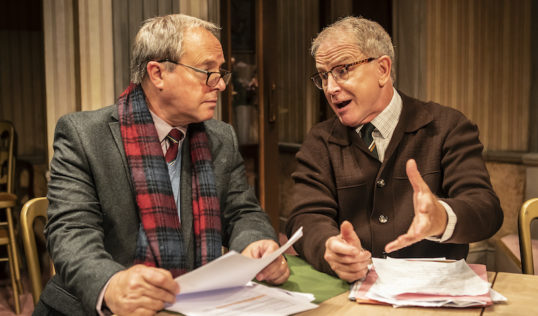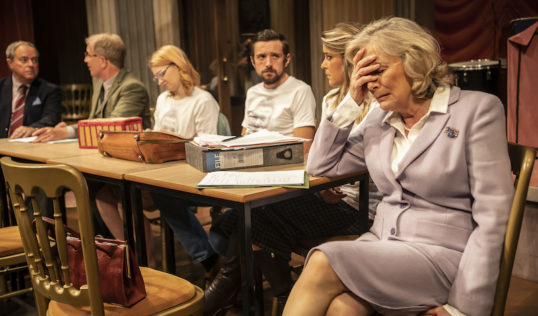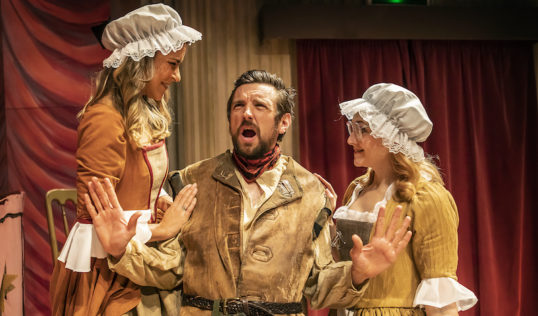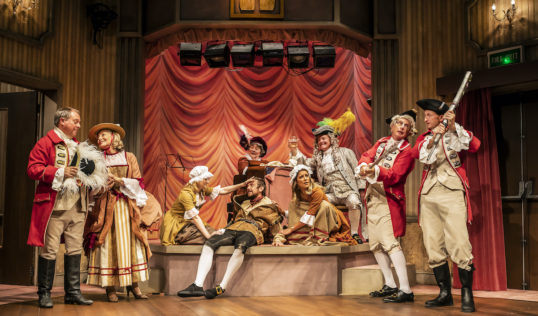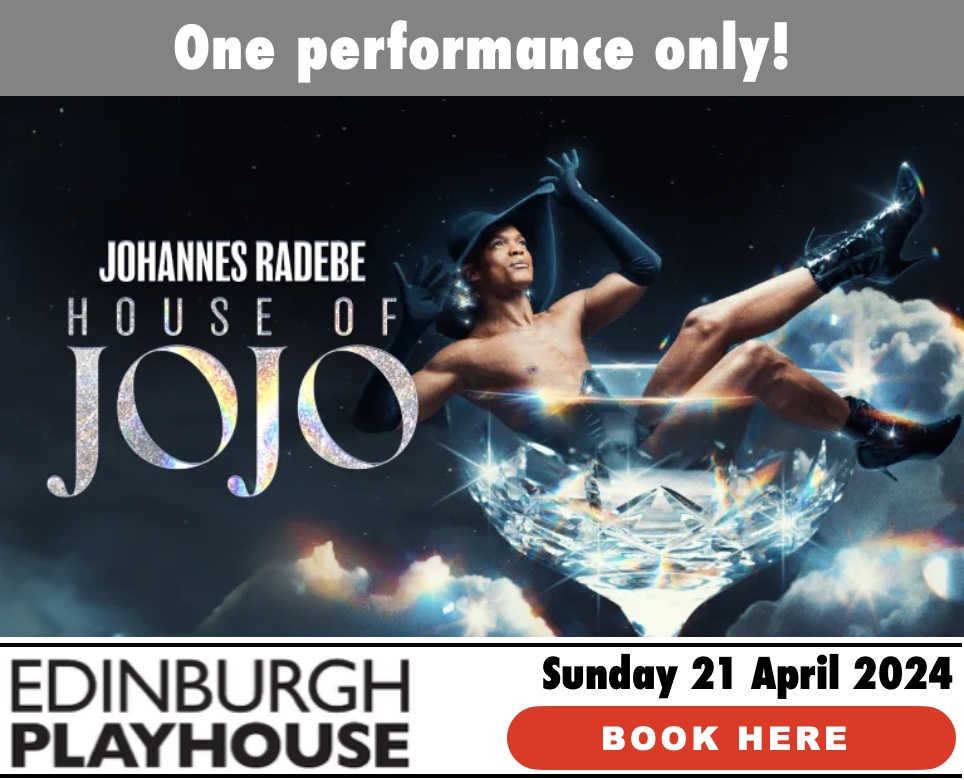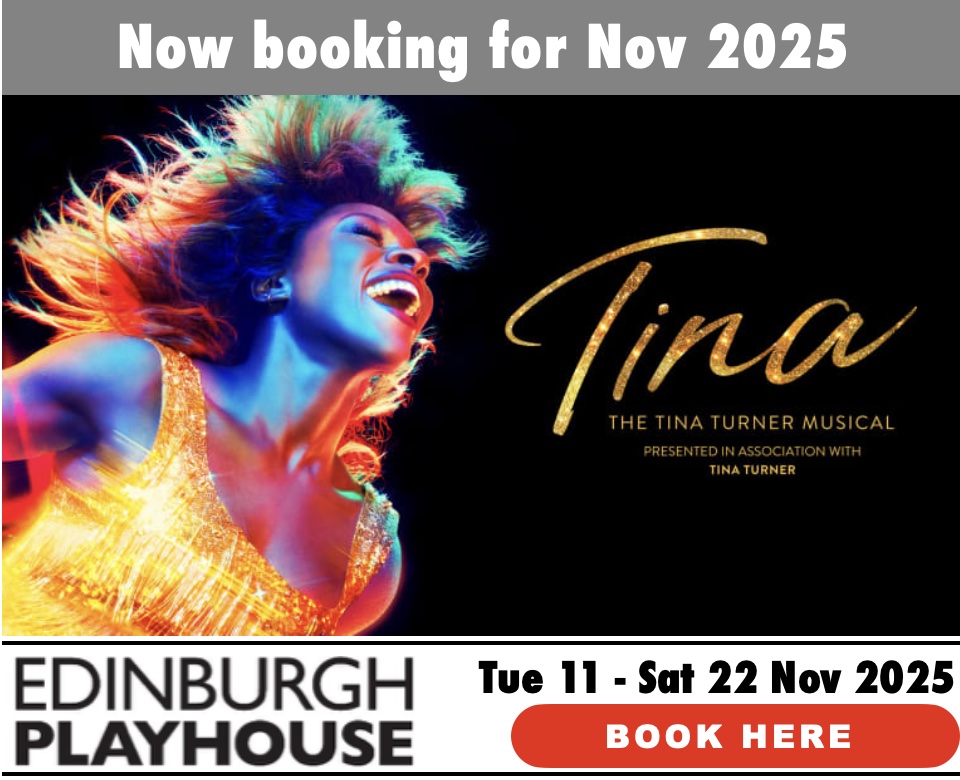Ten Times Table
★★★☆☆ Solid
King’s Theatre: Mon 3 – Sat 8 Feb 2020
Review by Hugh Simpson
There is a pleasing solidity to the touring production of Alan Ayckbourn’s Ten Times Table at the King’s all week, but it suffers from a shortage of inspiration.
What was Bill Kenwright’s Agatha Christie company, then the Classic Thriller, has now morphed into the Classic Comedy Company, with many of the same faces, instantly recognisable from a series of hit TV shows.
The name is misleading, as even Ayckbourn’s most devoted fans would struggle to call his 1977 play a ‘classic’; its depiction of the minutiae and ego-driven clashes of committee work is painfully accurate, and there is the requisite amount of finely-drawn characterisation and skewering of human vanity, but it is hardly one of his most highly-regarded works.
The peculiar structure has a lot to do with this, as essentially the play consists of a couple of hours of the cast sitting around a table and then twenty minutes of running around. It is possible to make the oddly static majority of the play involving through careful direction and finely-tuned ensemble work, but that is not really the case here.
This is not down to bad performances – the individual characters are well played, with considerable amounts of comic nous and an enviable command of timing.
development
The characterisations do tend towards the comically exaggerated, however, and come across as superficial as a result. The result is a series of comic turns with little sense of development. This means that it is difficult to believe in, or sympathise with, many of those on stage.
The Royal’s Robert Daws wrings a great deal of comedy from the role of Ray, the driving force behind a historical re-enactment of the ‘massacre of the Pendon Twelve’, a story with echoes of the Tolpuddle Martyrs, that soon spirals out of control when it is hijacked by both sides of the political spectrum.
However, presenting the character as a well-meaning buffoon, full of comedy tics and impressively elongated vowels, means that his disappointment as his pet project slides conclusively from his control is seriously underplayed.
Similarly, there are problems with Deborah Grant – of Bergerac fame – who plays Ray’s wife Helen, and Coronation Street’s Craig Gazey, who plays Eric, the Marxist teacher whose identification with the radical farm worker Jonathan Cockle soon takes on dangerous proportions.
apparently obsessed
Grant’s echoes of Margaret Thatcher, who was coming to prominence as the play was written, are skilfully done, while Gazey’s political posturing has genuine energy. However, both depictions are little more than caricatures, and lose impact accordingly. Gazey’s whiny petulance also means that it is difficult to see how either of the two women who are apparently obsessed with him would be so interested.
Gemma Oaten (of Emmerdale) as dog-breeder Sophie, and Rhiannon Handy as the almost-silent Philippa, accordingly have very little to work with in those two roles, but once again any lack of impact is not down to the acting itself.
That the production is best dealing in straight ahead, exaggerated comedy, is exemplified by Harry Gostelow’s firearm-obsessed farmer Tim, whose performance scores highly for farcical energy. Similarly, Elizabeth Power’s octogenarian minute-taker Audrey is beautifully pitched.
Ex-Blue Peter presenter Mark Curry, as her son Donald, the councillor whose spends his whole life at committee meetings, is funny enough in its portrayal of a pernickety time-server. The other side of the character – that the constant round of meetings is clearly a futile attempt to give meaning to an otherwise tragically unfulfilled life – only rarely peeps through.
predicament
Robert Duncan’s portrayal of businessman Laurence, who sees his career and marriage crumbling around him, features some perfectly pitched drunk acting, but the character’s predicament seems presented as a fait accompli rather than a work in progress. His excruciating drunken speech is done very well, but the other characters’ lack of reaction as it is taking place speaks volumes for the comparative absence of cohesion in the ensemble.
Robin Herford’s direction is accomplished and functional but lacking in spark and invention throughout, with much of the production looking as faded as the impressively down-at-heel hotel function room, realised wonderfully by designer Michael Holt, which serves as the location.
Despite the odd reference that shows its age, there is something oddly contemporary about a great deal of what is on display, not least in the way that half-remembered, half-invented notions of ‘heritage’ are exploited for narrow political ends.
Yet there is little of this urgency in a production that plays notably safe. As a result, it satisfies its audience without stretching them, and is noticeably short of genuine and sustained laughter.
Running time: Two hours and 20 minutes (including one interval)
King’s Theatre, 2 Leven Street EH3 9LQ.
Mon 3 – Sat 8 February 2020
Evenings 7.30pm, Matinees Wed & Sat 2.30pm
Tickets and details: Book here.
| Ten Times Table on tour 2020: | |||
|---|---|---|---|
| 3 – 8 February | Edinburgh Kings Theatre |
0131 529 6000 | Book online |
| 10 – 15 February | York Grand Opera House |
0844 871 7615 | Book online |
| 17 – 22 February | Shrewsbury Severn Theatre |
01743 281281 | Book online |
| 24 – 29 February | Cheltenham Everyman Theatre |
01242 572573 | Book online |
| 9 – 14 March | Chesterfield Pomegranate Theatre |
01246 345222 | Book online |
| 23 – 28 March | Brighton Theatre Royal |
0844 871 7615 | Book online |
ENDS








